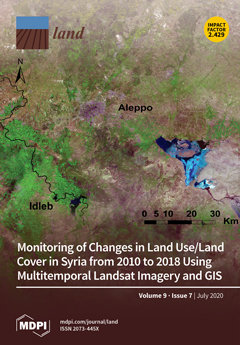Resources
Displaying 1376 - 1380 of 2258Transformation of Local People’s Property Rights Induced by New Town Development (Case Studies in Peri-Urban Areas in Indonesia)
New town development as a form of large-scale development is not a new phenomenon, particularly in developing countries. This development mainly takes place in peri-urban areas due to the high pressure caused by the growing population and the lack of facilities and infrastructure in city centres. As an effect, local communities who originally occupied the land often lose their rights over the property their livelihood might have relied on. Property rights can be grouped differently, classified according to different bundles: appropriation, ownership, and formality of rights.
On Landscape Architecture Education and Professional Practice and Their Future Challenges
Increased environmental and social risk, ubiquitous information technology, and growing demands for and growing threats to democracy and public participation will alter the education and practice of all the design professions and the geographically oriented sciences, and the ways in which their activities towards influencing environmental and social change are organized and carried out. We all know about these trends, but we do not take them seriously enough. We are not adapting fast enough towards education or professional practice that is collaborative and globally oriented.
Dynamics of Rural Economy: A Socio-Economic Understanding of Oil Palm Expansion and Landscape Changes in East Kalimantan, Indonesia
The fast-growing palm oil economy has stimulated a significant expansion of oil palm plantations in Indonesia. The uncontrolled development of large oil palm plantations has raised complex socio-ecological issues, including changes of ecological landscapes, organization of production, and farming household livelihood systems. For two oil palm villages with different ecological settings, this article describes changes in land cover, how production is organized, and the income structure changes due to rural economic development.
Challenges of Food Waste Governance: An Assessment of European Legislation on Food Waste and Recommendations for Improvement by Economic Instruments
Food is wasted throughout the entire food supply chain—from agricultural production to the household level. This has negative impacts on natural resources and the environment. At the same time, food waste is undermining the global target of food security. In turn, reducing food waste can minimise the environmental effects of agriculture on climate, biodiversity, soils, water bodies and the atmosphere.
Effectiveness of Cover Crops to Reduce Loss of Soil Organic Matter in a Rainfed Vineyard
Cover crops (CCs) minimize the loss of soil in permanent cropping systems where the soil is usually bare due to intense tillage or overuse of herbicides. The topsoil, the richer layer in soil organic carbon and organic matter (OM), is affected by water erosion. Nature-based solutions appear as a suitable option for sustainable farming. In this study, the effectiveness of two years of CC management to reduce the OM loss is evaluated in a rainfed vineyard in a rolling landscape (Huesca, NE Spain). Two sediment traps collected runoff over 15 months.


